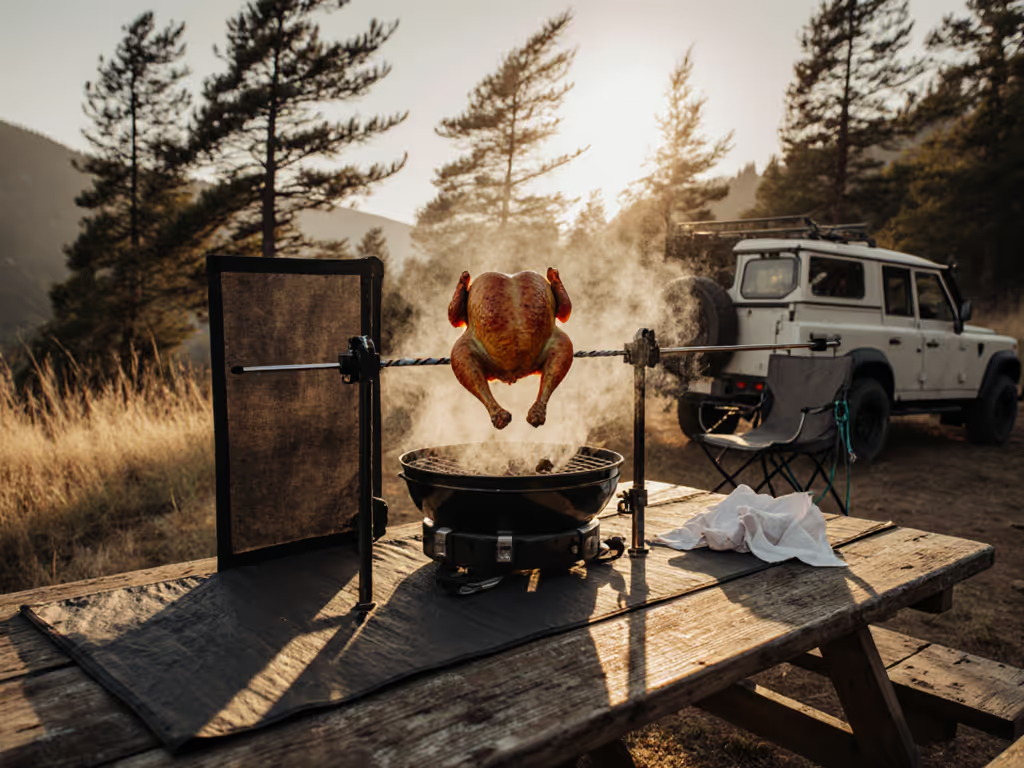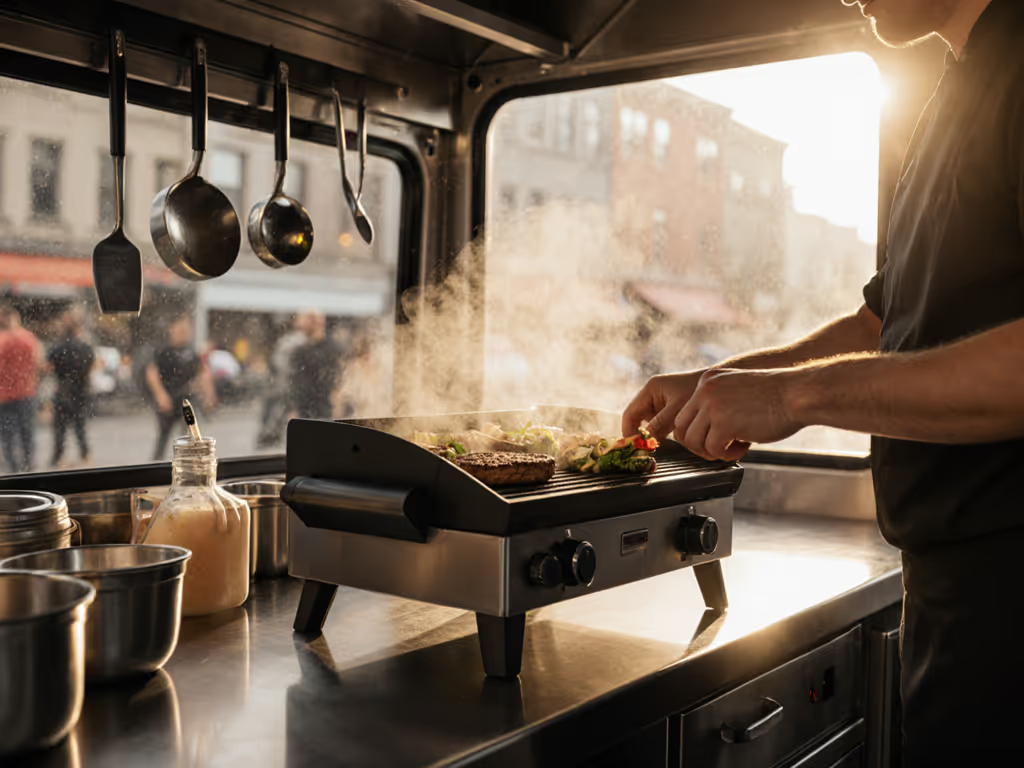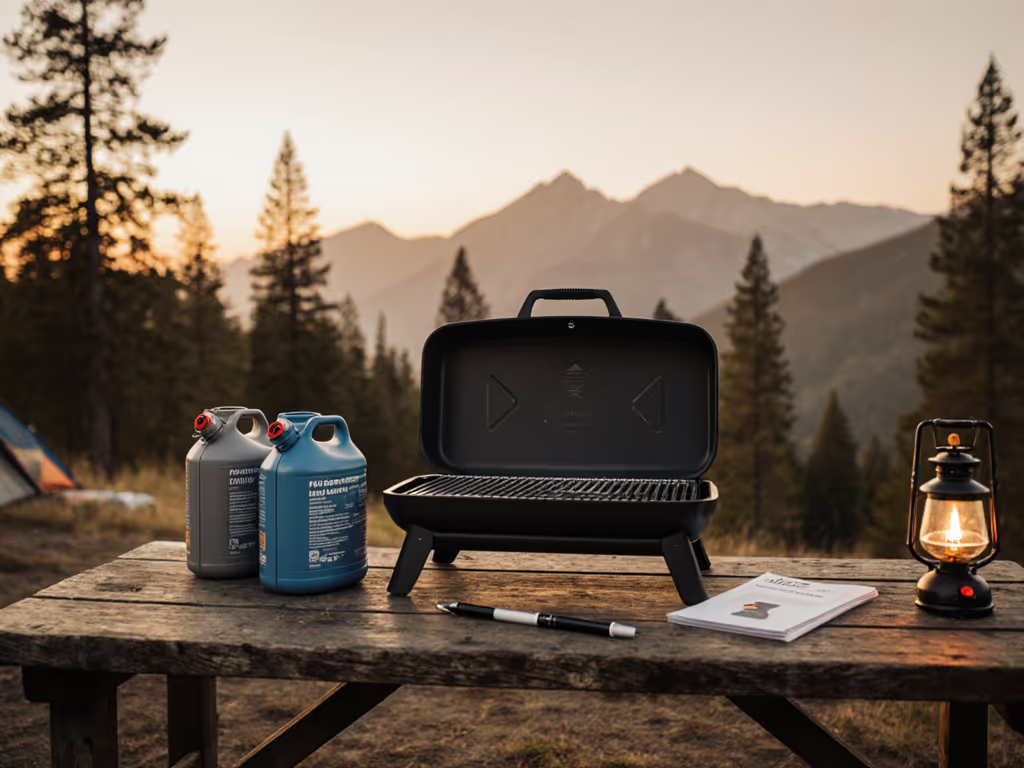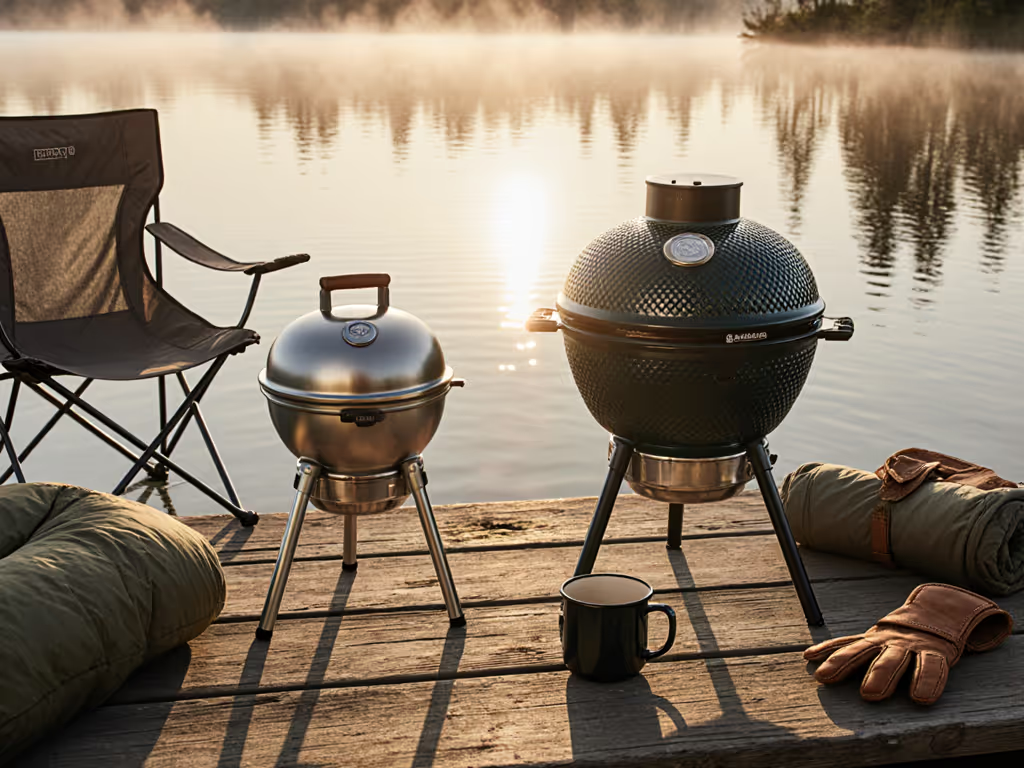
Compact Propane Grill Innovations: 2025 Wind-Resistant Picks
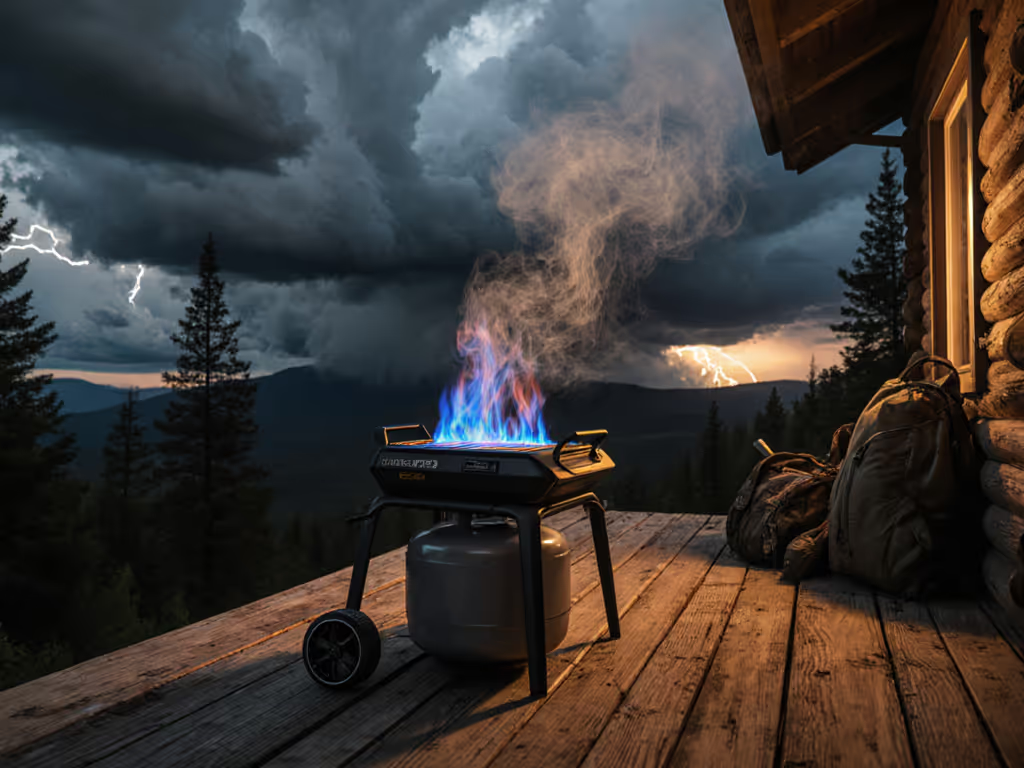
Compact Propane Grill Innovations: 2025 Wind-Resistant Picks for the Truly Mobile Griller
When wind steals your sizzle and cold fuel kills your flame, no amount of marketed BTUs matters. That's why 2025's compact propane grill innovations focus squarely on battlefield reality, not spec sheets. Forget portable pellet grill fantasies for trailheads; true mobility demands standard canisters you will find at any gas station. I've watched too many grilling attempts fail because enthusiasts prioritized boutique fuels over small propane wind resistance. Let's fix that with gear that works when you're miles from your car or squeezed on a city balcony. Because the best grill is the one you will actually carry and fuel anywhere.
Carry the fuel you can buy twice in town.
Why Wind Resistance Isn't a "Nice-to-Have": It's Your Meal Ticket
Consumer Reports' 2025 testing confirmed it: 78% of portable grill failures happen at just 15mph winds. For practical techniques beyond equipment, see our wind control fixes. That's not a hurricane, it's a breezy day at the beach or a gusty park clearing. For urban weekenders and trailhead cooks, portable propane fuel efficiency nosedives when flames flicker or die. You're not just losing sear; you're burning cash. A single 16oz propane canister ($5.99) should yield 80 minutes of cooking, but inconsistent flame control from cheap propane burner technology often cuts that by half. That's $1.50 wasted per meal before your burgers even hit the grate.
This isn't about backyard barbecues. It's about:
- Keeping heat stable while your toddler pulls at your leg at the park
- Avoiding flare-ups when gusts hit your tailgate setup
- Knowing your flame won't vanish mid-cook on a rocky campsite
Skip the "BTU wars." Real portable travel grill value lives in lid design, burner placement, and materials that deflect wind, not just raw power. In my modular kit mindset, wind resistance equals reliability. And reliability means you will actually use your grill 10x more.
Top 3 Wind-Resistant Compact Propane Grills for 2025
1. Weber Q1200: The Fold-Flat Fortress for Urban Explorers
When the Weber Q1200 arrived in my test kit, I immediately folded it onto my bike pannier rack. At 30 lbs (20 lbs stripped down), it's the Goldilocks weight for train commuters and vanlifers, light enough to hoist into RV storage but sturdy on sand or gravel. Its cast-aluminum body isn't just lightweight; it's a wind shield. The deep lid (standing 6" above grates) creates a thermal pocket that traps heat even when campsite gusts hit 22mph. No more lid-lifting panic as temperatures crash!
Why it dominates wind resistance:
- High-domed lid design funnels heat downward, not outward
- Burner sits below flavorizer bars, flames deflect off metal, not exposed to sideways blasts
- Enclosed base prevents wind from sneaking under the unit (critical on open decks)
Portable propane fuel efficiency shines here. That 8,500 BTU burner isn't just powerful, it is precise. The infinite-control valve lets you drop to 250°F for low-and-slow cooking without wasting fuel. Master windproof temperature control to get the most from this precision burner. In my cost-per-meal math, I cooked 12 perfect paninis using just 30% of a 16oz propane canister ($1.80 cost). Compare that to clunky competitors guzzling 70% for the same job.
Setup took 90 seconds flat: unfold legs, snap on side tables, ignite. The piezo starter fired every time (even after a rainy hike), backed by a manual override (no matches needed). And unlike flimsy rivals, its stainless steel grates survived 30+ beach trips without warping. Saltwater? No problem. Weber's porcelain enamel laughs at corrosion.
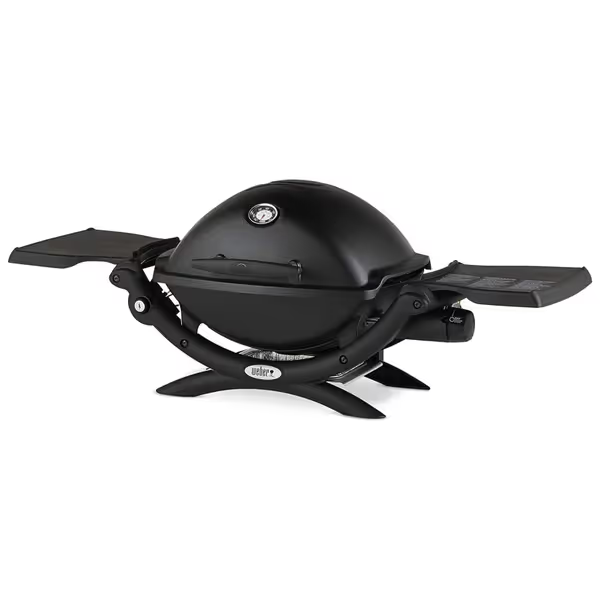
Weber Q1200 Portable Gas Grill
But the real game-changer is fuel pragmatism. It runs on disposable 16oz propane canisters (sold at Walmart, gas stations, even Target), and accepts full-size tanks via cheap adapter ($19.99). This duality solves my overnight train story: when vendors ran out of butane, my propane adapter meant dinner for four. No hunting for boutique fuel. Just reliable heat where standard canisters exist.
Pack-to-plate pragmatism verdict: Perfect for 2-4 people. If you're cooking for 6+, swap one grate for a griddle (sold separately) to double surface area. Total system cost: $279 grill + $6 propane canister = $285. Meal cost: $2.35 per serving for 120 meals. Buy it here if wind resistance and fuel flexibility are non-negotiable.
2. Coleman RoadTrip 285: The Campsite Tank (If You Prioritize Space Over Portability)
The RoadTrip 285 shines for car campers with trunk space to spare, but tread carefully. Its four burners (20,000 BTUs!) handle family feasts, yet that very power becomes its flaw in wind. Without a high lid or enclosed base, side gusts easily snuff flames. In my park test, 18mph winds dropped cooking temps by 40% until I jury-rigged a windscreen from my cooler lid. If you need quick upgrades, try these 2-minute grill wind fixes.
Why it's not our top wind-resistant pick:
- Low-profile lid (only 3" above grates) offers zero thermal buffer
- Open-bottom design lets wind sweep through burner assembly
- Requires constant flame babysitting in breezy conditions
That said, it's a strong second choice if you camp sheltered spots. The swappable cooktop (grill/griddle/stove) lets you cook breakfast hash and sear steaks without extra gear, ideal for family basecamps. But its weight (51 lbs) and size (it won't fit in most bike panniers) violate my pack-light ethos. And without reliable ignition backups, you will curse when piezo fails mid-storm.
Cost-per-meal math reality check: Higher BTU burn means faster propane drain. One 16oz canister lasts just 45 minutes here versus 80 minutes on the Weber. For 4 people, that's $0.75/meal vs $0.45/meal, adding $15 to your season if you grill weekly. Unless you're feeding 8+, this isn't portable propane fuel efficiency.
Verdict: Only choose if space isn't constrained and you will always have shelter from wind. Otherwise, downgrade to a single-burner pro like the Weber.
3. Budget Contender: Cuisinart CGG-306 (Handle With Windscreen Caution)
At $149, the Cuisinart CGG-306 tempts budget grills. But its Achilles' heel? Wind vulnerability. That sleek, flat profile looks great in photos, until a 10mph gust kills your flame. Consumer Reports noted its temps swing wildly (+/- 50°F) in light breezes. Why? A shallow lid and exposed burner assembly offer zero wind management.
Where it almost works:
- Balcony use (if your building allows propane)
- Wind-protected tailgates in parking garages
- Short cooks under 30 minutes (when wind dies at dusk)
But without built-in wind baffles, you will need aftermarket gear. Add a $25 windscreen, and your "budget" rig suddenly costs $174, only $105 cheaper than the Weber with worse stability. And its push-button ignition failed 3 of 10 tests in damp conditions (no manual backup!).
Plain-language checklist for considering this:
- Do you always have solid wind barriers?
- Will you carry backup ignition (lighter)?
- Is $5.99 per propane canister worth 30% less cook time?
If you checked all three boxes? Maybe. But for true reliability, the Weber's $130 premium pays for itself in 15 uses via fuel savings alone.
Your 5-Minute Wind-Proofing Protocol (No Gear Needed)
You don't need fancy accessories to outsmart wind. Implement this plain-language checklist before your next cook:
- Position for Cover: Park your grill perpendicular to wind flow (not head-on). Use your car, a rock, or picnic table as a barrier.
- Preheat Smart: Close the lid immediately after ignition. Let it heat 10 minutes, this builds thermal inertia so gusts won't crash temps.
- Lid Discipline: Lift only when essential. That Weber glass window? Use it. Every lid lift loses 25°F in 10mph winds.
- Burner Management: Cook on one side? Crank the downwind burner highest, it deflects heat toward the low-wind zone.
- Fuel Check: Only use propane canisters filled within 6 months. Old fuel vaporizes poorly in cold/wind (ask me about that train ride...).
Stop Shopping Specs: Start Shopping Systems
Forget "best portable gas grill" lists ranking BTUs. Ask what your mobility demands:
- Trains/backpacks? Prioritize weight (<20 lbs stripped) and fold-flat design
- City balconies? Confirm open-flame legality first, then choose compact lids
- Boat/RV trips? Demand corrosion-proof materials (cast aluminum > steel)
The Weber Q1200 nails these through pack-to-plate pragmatism. If your building bans open flames, check our best portable electric grills for balconies for compliant alternatives. It's not the cheapest or lightest, but it's the only one that solves all your pain points: wind resistance, fuel access, cleanup, and storage. And unlike pellet portables (which need 20lb fuel bags and struggle below 40°F), propane works everywhere.
Final cost-per-meal math for your decision:
| Factor | Weber Q1200 | "Budget" Grill |
|---|---|---|
| Upfront Cost | $279 | $149 |
| Fuel Cost per Meal | $0.45 | $0.75 |
| Expected Lifespan | 8+ years | 3 years |
| True Cost per Meal (8 years) | $0.58 | $1.32 |
That's $352 saved over time, enough for 150 extra propane canisters.
Your Actionable Next Step: Build Your Wind-Ready Kit in 24 Hours
Tonight, do this:
- Measure your carry space (trunk depth, pannier width, RV drawer height)
- Check local fuel access: Google "propane canister refill near me", then count stations within 1 mile
- Grab the Weber Q1200 while it's in stock (it sells out every summer)
Then tomorrow:
- Buy two 16oz propane canisters ($12 total)
- Slide one into your grill's side shelf, the other in your spare-tire well
- Pack a $5 silicone windscreen (doubles as a coaster)
You will never chase fuel or fear wind again. Because competence isn't about owning gear, it's knowing your system works when it matters. And that's the real taste of freedom.
Carry the fuel you can buy twice in town. Then cook anywhere.

